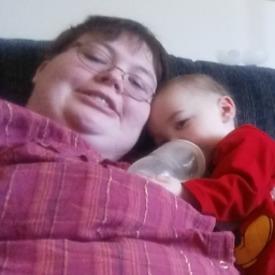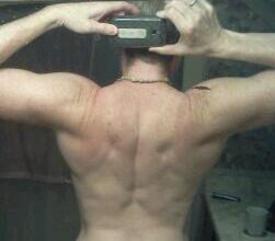Carbs vs calories

bunkahes
Posts: 216 Member
These two ways of loosing weight, keeping track of either calories or carbs, is one batter then the other or will it end the same, loosing weight like you wanted in the first palce.
0
Replies
-
Calories.
If you consume more calories than you burn, you gain weight. If you consume fewer calories than you burn, you lose weight. Those calories can come from carbs, fat, protein - it makes no difference (for the vast majority of people, who don't have medical issues that might otherwise require them to limit certain macronutrients).0 -
I have a big carbohydrate intolerance. Counting carbs works better for MY body.0
-
...keeping track of either calories or carbs,
Track calories, carbs are merely a source of calories, as are proteins and fats. You need all three of those for a healthy diet, although there are differences of opinion on the relative proportions.
Unless you have specific fitness goals, or medical requirements then there is nothing wrong with the MFP recommended balance.
The basic point is calories expended needs to exceed calories consumed, that way you'll start depleting your body stored energy and lose weight.0 -
^This. With certain medical conditions, reducing carbs can help, but if you cut carbs you can still gain weight if you're consuming too many calories.Calories.
If you consume more calories than you burn, you gain weight. If you consume fewer calories than you burn, you lose weight. Those calories can come from carbs, fat, protein - it makes no difference (for the vast majority of people, who don't have medical issues that might otherwise require them to limit certain macronutrients).0 -
I dono much, just that im boarderline diabetic and need a balanced amount carbs as they are (as far as i understand) slow burning sugars,,,0
-
calories aka portion control0
-
I dono much, just that im boarderline diabetic and need a balanced amount carbs as they are (as far as i understand) slow burning sugars,,,
diabetic ill give the one disclaimer moderate amounts (only time I say avoid anything like sodas and juice)0 -
Counting calories is the way to go. If I counted just carbs I'd be way over my calorie goal because I rarely get to the carb goal set for me on MFP.0
-
What is a slow active sugar0
-
...keeping track of either calories or carbs,
Track calories, carbs are merely a source of calories, as are proteins and fats. You need all three of those for a healthy diet, although there are differences of opinion on the relative proportions.
Unless you have specific fitness goals, or medical requirements then there is nothing wrong with the MFP recommended balance.
The basic point is calories expended needs to exceed calories consumed, that way you'll start depleting your body stored energy and lose weight.
+10 -
I track carbs. I have learned that I am extremely carb sensitive. I aim for 25 net carbs or less a day and have lost 80+ pounds in 11 months.
 0
0 -
Track both. Up your protein and healthy fats, reduce carbs, and still keep a calorie deficit to ensure you lose weight0
-
I added whole wheat instead of white to my diet, and i eat at least 3 fruits a day, i do not eat bread. but i get grains in other ways0
-
What is a slow active sugar
methinks that the other contributor is a little confused.
Carbs are your fuel, proteins build muscle and organs.
Carbs fall into a range of different fuels, some burn quickly, some tend to burn over a longer period. So simple sugars tend to burn up quickly, like glucose and the like. As it's simple it's easy for your body to use. More complex carbs burn up over a longer period, pasta, rice etc.
What I tend to find is that I'll eat a mix oc simple and complex carbs in the morning; muesli, yoghurt, banana, apple. That fuels me up and gets me moving.
Another complex carb mid morning will hack me through to lunch. That's based on breakfast at 0530 and lunch at about 1230.
Lunch will tend to be more protein based; oily fish with salad, sliced ham with salad, oily fish with rice.
Dinner will tend to be more protein based. I tend to train early evening, running, cycling, rowing or resistance training, so the protein heavy focus is more appropriate for immediate post exercise as ones system is ready to make best use of the benefits.0 -
If you don't have a medical reason for doing so, cutting carbs is unnecessary. The reason cutting carbs works for weight loss is that many carbs like pasta, breads, potatoes, etc are calorie dense foods...you cut carbs and you inadvertently cut calories. There is no magic...weight loss is predicated on you taking in less energy (calories) than you need to maintain your weight. All diets for weight loss must somehow incorporate a calorie deficit to work.
One caveat with cutting carbs is that you will lose a lot of water weight to start as you deplete your glycogen stores to nothing and you don't require as much water for processing of carbs since you're not eating them. This is why low carbers lose a ton of weight early on...water and glycogen. It comes on just as fast once you start consuming carbs again because you will immediately replenish your glycogen stores and will require that water for processing carbohydrates.0 -
I have been a controlled diabetic, for years. In the beginning i had a strict diet, with a low carb diet and still sick and i was sick off and on for a long time, I just started last summer to start trying to loose weight and exercise more. Since winter started i have exercised because of the roads are too icy.
quote]
If you don't have a medical reason for doing so, cutting carbs is unnecessary. The reason cutting carbs works for weight loss is that many carbs like pasta, breads, potatoes, etc are calorie dense foods...you cut carbs and you inadvertently cut calories. There is no magic...weight loss is predicated on you taking in less energy (calories) than you need to maintain your weight. All diets for weight loss must somehow incorporate a calorie deficit to work.
One caveat with cutting carbs is that you will lose a lot of water weight to start as you deplete your glycogen stores to nothing and you don't require as much water for processing of carbs since you're not eating them. This is why low carbers lose a ton of weight early on...water and glycogen. It comes on just as fast once you start consuming carbs again because you will immediately replenish your glycogen stores and will require that water for processing carbohydrates.
[/quote]0 -
I have been a controlled diabetic, for years. In the beginning i had a strict diet, with a low carb diet and still sick and i was sick off and on for a long time, I just started last summer to start trying to loose weight and exercise more. Since winter started i have exercised because of the roads are too icy.
question are you controlled with diet or medication?0 -
Track both. Up your protein and healthy fats, reduce carbs, and still keep a calorie deficit to ensure you lose weight0
-
I have been a controlled diabetic, for years. In the beginning i had a strict diet, with a low carb diet and still sick and i was sick off and on for a long time, I just started last summer to start trying to loose weight and exercise more. Since winter started i have exercised because of the roads are too icy.
quote]
Re: icy roads. Have you tried indoor "walking" ......exercise helps control blood sugar also
Jessica Smith & Leslie Sansone are great
http://www.youtube.com/results?search_query=jessica+smith+walking&sm=10 -
I have been a controlled diabetic, for years. In the beginning i had a strict diet, with a low carb diet and still sick and i was sick off and on for a long time, I just started last summer to start trying to loose weight and exercise more. Since winter started i have exercised because of the roads are too icy.
quote]
Re: icy roads. Have you tried indoor "walking" ......exercise helps control blood sugar also
Jessica Smith & Leslie Sansone are great
Re: yeah i will try walking around the inside after the holiday
http://www.youtube.com/results?search_query=jessica+smith+walking&sm=10 -
From a recently-diagnosed T1 diabetic:
It is a lot easier to count calories, but you tend to get more "bang per calorie" through carbs. From what I remember, 1g of carbs is equal to about 3 or 4 calories, whereas protein and fat are around 1g for 7-9 calories. So, in theory, if I could eat 100 calories for a meal, I could have 25-33g carbs or 9-13g protein/fat.
Before receiving an insulin to carb ratio, I was on a low-carb diet and noticed that, though low in carbs, the diets tend to be high in fat (especially saturated) and protein, and higher in calories as a result.
Just remember, especially if you are on insulin, to check your blood sugars before eating and really pay attention to what various foods and exercise can do to your levels. For example, if I take a half-hour walk after 5PM, I know that I will most likely go low during the night unless I adjust my dinner/night snack bolus.0 -
If you don't have a medical reason for doing so, cutting carbs is unnecessary. The reason cutting carbs works for weight loss is that many carbs like pasta, breads, potatoes, etc are calorie dense foods...you cut carbs and you inadvertently cut calories. There is no magic...weight loss is predicated on you taking in less energy (calories) than you need to maintain your weight. All diets for weight loss must somehow incorporate a calorie deficit to work.
One caveat with cutting carbs is that you will lose a lot of water weight to start as you deplete your glycogen stores to nothing and you don't require as much water for processing of carbs since you're not eating them. This is why low carbers lose a ton of weight early on...water and glycogen. It comes on just as fast once you start consuming carbs again because you will immediately replenish your glycogen stores and will require that water for processing carbohydrates.
Thanks!! Just answered a question I posted on a different thread perfectly!0 -
Yeah you lose lots of water weight because carbs require 3-4g of water per 1g carb or something like that. Low carbing works because it often accompanies a caloric deficit, but it's not good for you. Try reading the book 80/10/10, it'll give you a really good, fresh perspective on health and weight loss.
 Not to mention you can eat a much greater quantity of food when you're eating carbs, just make them good carbs like fruits and veg. xx 0
Not to mention you can eat a much greater quantity of food when you're eating carbs, just make them good carbs like fruits and veg. xx 0 -
It is not one or the other. Both matter. You can track or count anything you like but it all counts.0
-
I have been a controlled diabetic, for years. In the beginning i had a strict diet, with a low carb diet and still sick and i was sick off and on for a long time, I just started last summer to start trying to loose weight and exercise more.
Given your circumstances I'd suggest a discussion with your clinician about getting some proper dietary advice,
From what you're saying, although it's difficult to establish, you've tried a low carb diet and it didnt work for you. IN that case all of the advice suggesting you cut carbs isn't going to be helpful to you.
If you're using medical controls for your diabetes then you need to make sure that you're consuming the appropriate balance of inputs, otherwise the treatment isn't aiming for the right outcome.
Notwithstanding all of that, weight loss comes down to energy in vs energy out. You measure energy using calories.0
This discussion has been closed.
Categories
- All Categories
- 1.4M Health, Wellness and Goals
- 398.5K Introduce Yourself
- 44.7K Getting Started
- 261K Health and Weight Loss
- 176.4K Food and Nutrition
- 47.7K Recipes
- 233K Fitness and Exercise
- 462 Sleep, Mindfulness and Overall Wellness
- 6.5K Goal: Maintaining Weight
- 8.7K Goal: Gaining Weight and Body Building
- 153.5K Motivation and Support
- 8.4K Challenges
- 1.4K Debate Club
- 96.5K Chit-Chat
- 2.6K Fun and Games
- 4.8K MyFitnessPal Information
- 18 News and Announcements
- 21 MyFitnessPal Academy
- 1.5K Feature Suggestions and Ideas
- 3.2K MyFitnessPal Tech Support Questions














